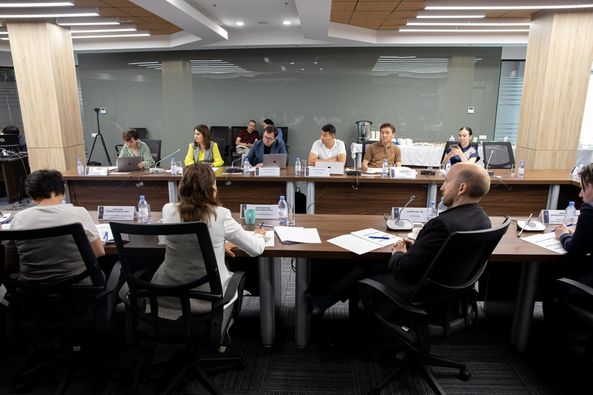MeetUp dedicated to the research in education and human capital development took place in Yelbasy Academy on July 27, 2022.
The President of the “Beles” Center for Analysis and Strategy Serik Irsaliyev and the Head of Research Department at BTS Education Bauyrzhan Abuov presented the results of the research “Parents in Kazakhstan: The Role in the Education of Chidren after the Pandemic”. Serik Irsaliyev started his presentation with the definition of the three main actors in the education process: school and teacher, parents and environment, as well as children. It is extremely important that all three actors are equally involved in the process.
According to PISA-2018 data, for every 10 percentage points increase in the share of parents' involvement in discussing their children's achievements with teachers, the results of children's literacy skills has been increasing by 10 points. PIRLS-2016 revealed that 4th grade students whose parents often engaged with homeschooling, teaching them literacy, had results 24 points higher than those students whose parents sometimes homeschool them, and 110 points higher than those whose parents almost never involved in homeschooling their children. Thus, we can conclude that parents are, in fact, the first teachers.
A meta-analysis of 75 studies revealed links between parental involvement and children's academic performance, 4 out of which showed the greatest positive correlation:
- reading together at home
- high expectations of parents from the educational achievements of their children
- communication of parents with children on education and school issues
- parental encouragement and support for children
At the end of the speech, a number of recommendations were proposed:
At the national level:
- to create a national portal to support parental involvement - curricula in an accessible form, detailed instructions on how to consolidate educational material at home or correction for the underachieving students, a news series for parents about educational innovations, a selection of successful examples of parental involvement, the possibility of feedback and answers to all questions of interest to parents;
- to develop a mock-up of a manual for schools to establish a school-child-parent partnership;
- to develop methodological recommendations for parents on the importance of their active participation in the education and upbringing of children, with tips on how to become an active part of the school community, a partner of the child in his education;
- to develop a program of professional development for teachers in the field of partnership with parents.
At the institutional level:
- to systematically conduct surveys, interviews and focus groups with parents to develop strategic documents on their involvement;
- to introduce normatively the practice of conducting open lessons with the participation of parents (parents and family "learning" walks);
- to consolidate legally the provision of parents with an individual, personalized report on the development, problems and opportunities for the development of the child once in an academic quarter;
- develop informal cooperation with parents: joint dinners of teachers with parents, game nights with parents and other events that develop the skills of parents and children in the field of problem solving, communication, critical thinking;
- to develop parents' volunteering: conducting excursions, reading courses, storytelling, assistance in the library, attendance of events with the participation of a celebrity, stories about the traditions of their family, conducting extracurricular activities, assistance to a teacher in conducting a lesson.
Bauyrzhan Abuov presented the survey methodology for parents and teachers including data collection, analysis and visualization.
It is worth noting that the conducted research is one of the largest during the Independence of Kazakhstan and covered the most numerous number of respondents in education.
The organizators and participants expressed their gratitude to speakers and shared their comments regarding the research.
Analytical report “Parents in Kazakhstan: The Role in the Education of Chidren after the Pandemic”

